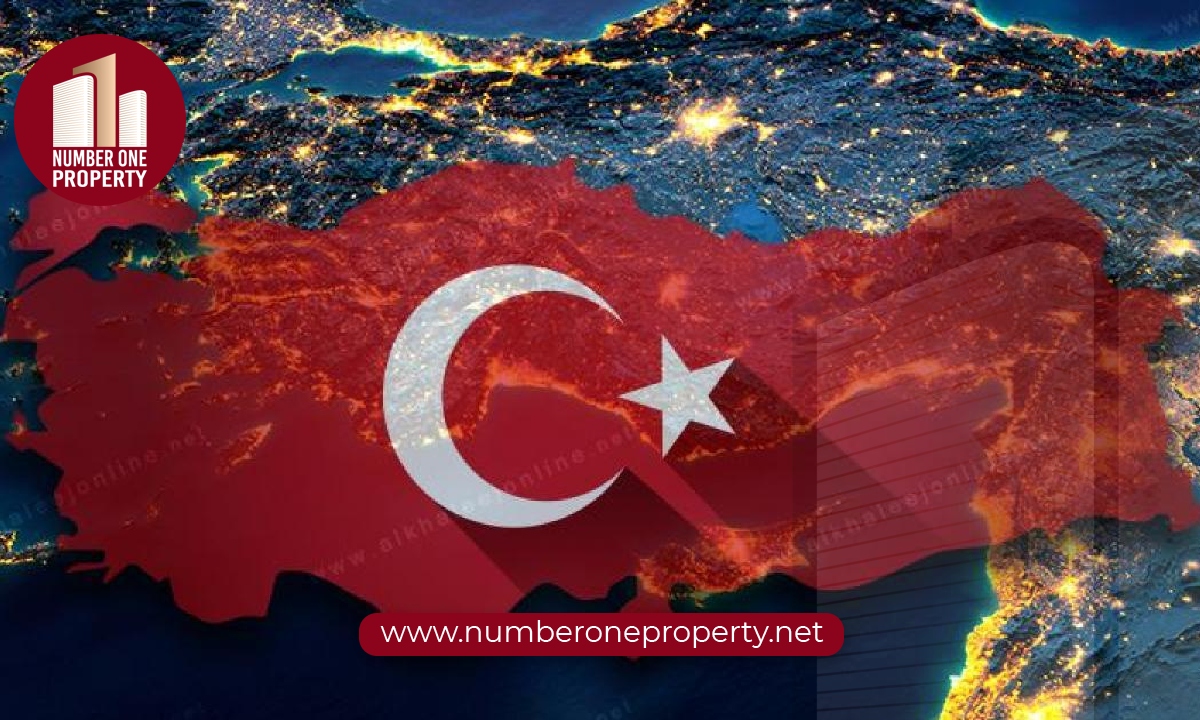In the second article about information about Turkey, we will highlight some of the vital things that distinguish this great country. We will move with you through the site and the diversity of the terrain to dive deep into history, to return together to the present days and talk about the political and administrative system. We will leave room to talk about Turkey's economy and conclude with Turkish culture and society.
Geographical location and terrain in Turkey
The strategic location between Asia and Europe and its impact on culture and economy
Turkey enjoys a unique strategic location linking Asia and Europe, separated by the Bosphorus Strait and the Dardanelles Strait, which connect the Black Sea to the Sea of Marmara and the Mediterranean Sea. This unique location has given Turkey a vital role as a bridge between East and West, and has helped it to be a point of intersection for different civilizations and cultures throughout history.
The geographical location has played a major role in trade and economy, as Turkey is an important commercial and transit center for goods between Europe and Asia. Turkey has an advanced infrastructure network of ports, roads and railways that enhance its role as a center for regional and global trade.
This strategic location is also reflected in the cultural diversity of Turkey, where Asian cultural influences blend with European ones, giving the country a unique character. Major cities such as Istanbul are known for their rich cultural heritage resulting from the succession of different civilizations, and are considered a center that brings together different cultures and enhances social diversity.
Diversity in terrain between plains, mountains, rivers and coastal areas
Turkey is characterized by a great diversity in terrain that combines plains, mountains, rivers and coasts, making it a rich region in terms of geography and nature.
Plains: Plains are spread across different regions of Turkey, the most famous of which is the Anatolian Plain, which extends across the central part of the country. These plains are an important agricultural area, where grains and agricultural crops are grown, contributing to supporting the Turkish economy and providing food.
Mountains: Mountains cover a large part of Turkey, the most famous of which are the Taurus Mountains that extend along the southern coast, and the Pontic Mountains on the northern coast. The mountains in Turkey form picturesque natural sites that attract nature lovers and skiing in the winter.
Rivers: Rivers in Turkey are an important source of water and agriculture, the most important of which are the Euphrates and Tigris rivers, which run through the eastern part of the country.
These rivers provide water for agriculture and are used to generate hydroelectric power. Coasts: Turkey's coasts extend along the Mediterranean, Aegean and Black Seas, giving Turkey a diverse marine environment and unique tourist attractions. The coasts include many beautiful sandy beaches and tourist resorts, such as Bodrum and Marmaris, which attract tourists from all over the world.
Climate in Turkey and its differences between regions

The climate in Turkey is characterized by great diversity due to the diverse terrain and geographical location. Weather conditions vary greatly between coastal and inland areas, resulting in a great diversity in weather, plants and wildlife.
Coastal areas: The coastal areas on the Mediterranean and Aegean Seas enjoy a moderate Mediterranean climate, where summers are hot and dry, and winters are mild and rainy. These conditions make coastal areas a favorite destination for tourists throughout the year, especially in the summer.
Inland areas: The inland areas, such as the Anatolian Plateau, have a continental climate, where summers are hot and dry, while winters are cold and harsh with snowfall in some areas. This climate witnesses a great variation in temperatures between seasons, which affects the quality of agricultural crops grown in these areas.
Northern areas: The areas overlooking the Black Sea enjoy a moderate and humid climate throughout the year, with regular rainfall, leading to dense growth of forests and green lands. The Black Sea region is known for its permanent green spaces, where tea and hazelnut cultivation prevail.
Turkey's unique geographical location and topographic diversity are important attractions for visitors and investors alike. The location between the two continents gives Turkey a distinct role in politics, economy and culture, while the diverse terrain provides a picturesque natural environment ranging from towering mountains to magnificent coasts. The diverse climate also enhances the diversity of crops and tourism activities, contributing to making Turkey a distinct tourist and economic destination.
History and Civilizations in Turkey
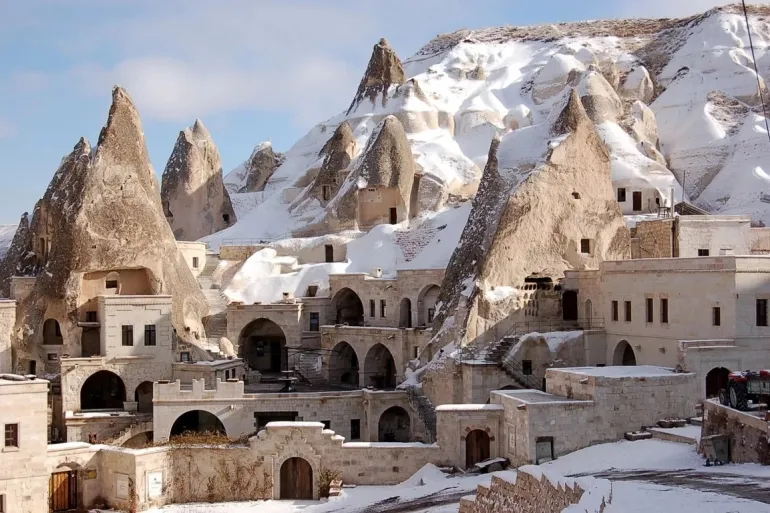
Turkey has experienced many important civilizations throughout the ages
Turkey is one of the regions that has witnessed the succession of many ancient civilizations throughout history, thanks to its strategic location between the continents of Asia and Europe. Many civilizations have flourished on its land, most notably the Byzantine and Ottoman civilizations, in addition to older civilizations such as the Hittites, Phrygians and Romans.
Byzantine Civilization: The Byzantine Empire was founded by Emperor Constantine in the fourth century AD, and Constantinople (today's Istanbul) was its capital. The Byzantine civilization developed into an important center of Christianity in the Middle Ages, and played a major role in spreading culture, arts, and science in the region. The Byzantine Empire lasted for centuries, and was part of the ancient Romans, until it fell to the Ottomans in the 15th century.
Ottoman Civilization: The Ottoman Empire was founded in the late 13th century by Osman I, and expanded to become one of the largest empires in history. It took Istanbul as its capital after the conquest of Constantinople in 1453, and reached the peak of its power during the 16th and 17th centuries under Sultan Suleiman the Magnificent. The Ottoman civilization lasted for more than 600 years, and was a prominent political, cultural, and economic power, until it was dissolved after World War I and the Turkish Republic was established by Mustafa Kemal Ataturk in 1923.
Famous Historical Landmarks in Turkey
Topkapi Palace: Topkapi Palace is one of the most important historical landmarks in Istanbul, and was the main seat of the Ottoman sultans for more than 400 years. The palace includes several royal suites and harem sections, in addition to the armory and a collection of precious treasures. Today, the palace is a museum that tells the history of the Ottomans and displays their belongings.
Hagia Sophia: Built in the 6th century AD as a church during the reign of the Byzantine Emperor Justinian, Hagia Sophia later became a mosque during the Ottoman era. Today, Hagia Sophia is a symbol of religious tolerance and cultural diversity in Turkey and is one of the most prominent tourist and historical landmarks in Istanbul.
Ephesus: Located near the city of Izmir, the ancient city of Ephesus was an important urban center in the Greek and Roman eras. Ephesus contains many Roman ruins, such as the Temple of Artemis, which was considered one of the Seven Wonders of the Ancient World, the Great Theater, and the Curie Street, which runs between the massive columns.
Tarsus: Tarsus is one of the oldest cities in Turkey, located in the southern Anatolia region. It was the birthplace of Paul of Tarsus (Saint Paul) and contains landmarks dating back to various periods of history, from the Roman era to the Ottoman era.
The Impact of History on Modern Turkey and How Heritage Appears in Turkish Culture Today
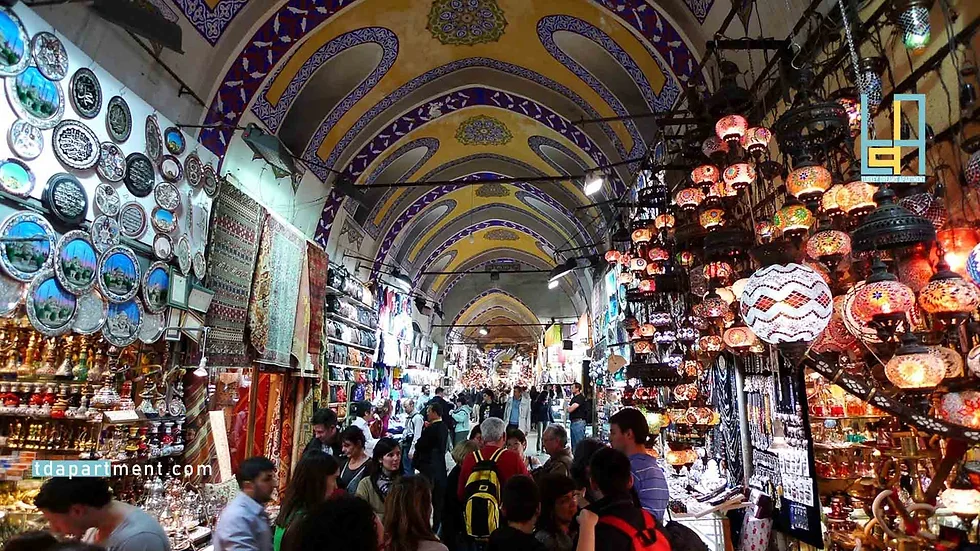
History plays an important role in shaping the cultural identity of Turkey today. Modern Turkey reflects the influence of successive civilizations in its architectural features, social traditions and customs. Byzantine and Ottoman heritage blend with modernity in daily life, making Turkey rich in cultural and historical diversity.
Architectural heritage: The influence of Ottoman civilization is evident in many traditional buildings and mosques with towering domes and minarets, while the influence of Byzantine art is evident in churches and museums containing historical mosaics.
Social traditions: Ottoman traditions and local customs are still evident in people’s daily lives, such as the famous Turkish hospitality traditions, manifestations of mutual respect in society, and the value of family and social solidarity. Traditional Turkish foods, such as kebab and baklava, are part of the folklore that is preserved to this day.
Cultural festivals: Many cultural festivals are held in Turkey that celebrate history and heritage, such as the Istanbul Film Festival and the Konya International Dervish Festival, where Sufi history and Ottoman musical heritage are celebrated.
Education and Arts: Educational and cultural institutions in Turkey seek to preserve the historical legacy by teaching the history of ancient civilizations, and cherishing the folk heritage in traditional arts and crafts, which enhances the value of Turkish identity and reflects the cultural diversity of the country.
Turkey’s rich history reflects the great civilizations that have passed through it throughout the ages, which have greatly influenced the formation of the current Turkish society. This heritage is clearly evident in historical buildings, and in social and cultural values, making Turkey a destination rich not only in history but also in a unique cultural experience that connects the past with the present.
Political and Administrative System in Turkey
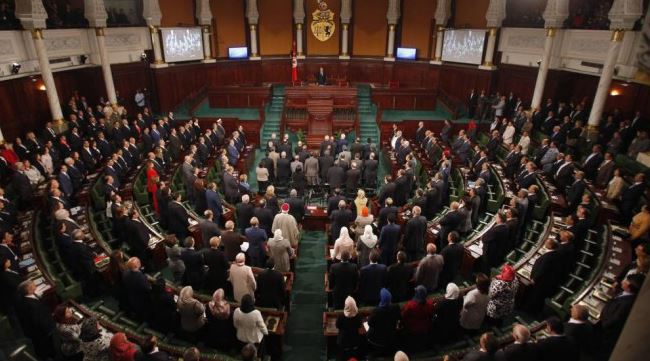
A Look at the Political System in Turkey Today:
The Presidential Republic and the Most Prominent Political Parties
The political system in Turkey is currently based on the presidential republic, as the system was transformed from a parliamentary system to a presidential one after a referendum in 2017. According to the amended Turkish Constitution, the President of the Republic has broad powers, including appointing ministers and setting and directing government policies.
The President is directly elected by the people for a five-year term, and is eligible to run for a second term. The President has broad executive powers, making him responsible for managing government affairs and implementing laws.
There are many prominent political parties in Türkiye, the most important of which are:
- Justice and Development Party (AKP): The ruling party in Turkey, and is considered a conservative party. It was founded in 2001 and is headed by the current president, Recep Tayyip Erdogan.
- Republican People's Party (CHP): The oldest political party in Turkey, and is considered a secular and social party. It is considered the main opposition party in the country.
- Nationalist Movement Party (MHP): It is considered a right-wing nationalist party, supports Turkish national values, and has an alliance with the Justice and Development Party.
- Peoples' Democratic Party (HDP): It is a liberal party that seeks to promote minority rights, and is considered an influential party in the southeastern regions of Turkey, which are predominantly Kurdish.
Legislative, executive and judicial authorities and how the affairs of the state are run
Legislative authority: The Turkish Parliament (the Grand National Assembly of Turkey) exercises legislative authority, and includes 600 members who are elected every five years through general elections. The Parliament has the power to enact laws, approve the budget and monitor the government. The Parliament also has the power to ratify international agreements.
Executive Authority: Executive authority is concentrated in the hands of the President of the Republic, who is considered the head of state and government, and appoints ministers and advisors and sets government policies. The President has broad powers, including commanding the armed forces and directing foreign policies, and has the right to issue presidential decrees in cases that do not conflict with the law.
Judicial Authority: The judiciary is independent, and is responsible for enforcing the law and protecting the rights of individuals. The judicial system is headed by the Constitutional Court, which monitors the constitutionality of laws and decrees. There are also higher courts such as the Court of Appeal and the Council of State. Judges are appointed with the approval of the Supreme Judicial Council and the Public Prosecutor, with the aim of ensuring the independence of the judiciary from the executive and legislative branches.
Division of Turkey into provinces and regions and how regions are administered
Turkey is divided into 81 provinces (governorates), and each province is administered by a governor appointed by the central government. The governor is the representative of the executive authority in the province, and works in coordination with local administrations and municipalities.
The provinces are divided into regions according to their geographical location, with Turkey having seven main regions: Marmara, Black Sea, Aegean, Central Anatolia, Eastern Anatolia, Southeastern Anatolia, and Mediterranean.
Municipal and local councils have limited powers to manage local affairs such as public hygiene and urban transportation, but are subject to the supervision of the governor and the central government. Mayors and mayors are elected by the people, giving citizens a role in managing their local affairs.
Turkey organizes the affairs of the provinces through government ministries, such as the Ministry of Interior, which oversees security and order in the provinces, the Ministry of National Education, which is responsible for education in local schools, and the Ministry of Health, which runs hospitals and public health centers.
The political and administrative system in Turkey represents a complex model that combines the presidential system with administrative centralization, with an emphasis on the distribution of powers among the three branches. The local administrative system allows a limited role for local governments, but ensures continuity of oversight from the central government, which contributes to the stability of the political system and allows the state to effectively face challenges.
Economy in Türkiye
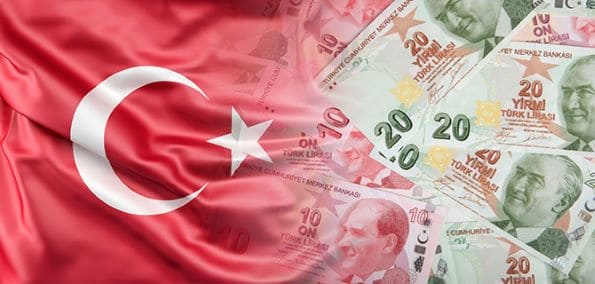
Overview of the Turkish Economy and Key Sectors
The Turkish economy is a fast-growing emerging economy, ranking high globally in terms of GDP. The Turkish economy relies on diversification in economic sectors, which provides a solid foundation for economic growth and contributes to enhancing financial stability.
Industry: Turkey is one of the major industrial countries in the region, producing a wide range of goods such as machinery, equipment, cars, and electronics. Turkey is one of the largest exporters of cars in Europe, where cars are manufactured for well-known global brands. The country is also known for its heavy industries such as iron, steel, and petrochemicals.
Agriculture: The agricultural sector has an important position in the Turkish economy, providing employment opportunities for about 18% of the population. Turkey produces large quantities of wheat and barley, and ranks first in the world in the production of hazelnuts and figs, and is one of the largest producers of olives and fruits such as grapes and citrus fruits. Turkey's diverse climate supports the growth of various crops, making it an important agricultural center.
Tourism: Tourism plays a prominent role in the Turkish economy, as Turkey attracts millions of tourists annually from all over the world. Turkey has a variety of tourist sites including beaches, historical sites such as Hagia Sophia and Topkapi Palace, and coastal cities such as Antalya and Bodrum. Medical tourism is also an important part of the tourism sector, as tourists head to benefit from advanced medical services and hot springs. We will expand on our discussion of tourism in the next article.
Turkey's role in international trade thanks to its geographical location
Turkey's geographical location has strategic importance as it connects two continents, Asia and Europe, giving it a competitive advantage in international trade. Turkey is located on the New Silk Road that connects China to Europe, enhancing its role as a major trade hub.
Turkey benefits from the customs union with the European Union, which allows for duty-free trade between Turkey and EU countries. Europe is Turkey's largest trading partner, importing large quantities of industrial goods such as cars, electrical appliances, and textiles from it.
In addition, Turkey is investing in developing ports and infrastructure to enhance its logistics capabilities. It has advanced ports such as Haydarpasa Port and Izmir Port that contribute to facilitating the movement of goods and facilitating trade with other countries. This advanced infrastructure allows Turkey to play a prominent role in meeting the needs of neighboring countries for goods and resources.
Economic challenges such as inflation, the value of the Turkish lira, and how the government is working to improve the economic situation
Inflation: The Turkish economy suffers from high inflation rates, which negatively affects the purchasing power of citizens. Inflation has risen significantly in recent years, prompting the government to take measures to control inflation through tight monetary policies and increasing interest rates.
The value of the Turkish lira: The Turkish lira faces significant fluctuations in its value against foreign currencies, which poses a challenge to the Turkish economy, especially in the import sector that depends on foreign currencies. The value of the lira has fallen significantly in recent years, leading to an increase in the cost of imports and an increase in the prices of basic goods.
Government measures to improve the situation: The Turkish government seeks to address these challenges through economic reform programs aimed at promoting domestic and foreign investment, and stimulating growth in productive sectors such as industry and agriculture. In addition, the government is taking measures to reduce dependence on imports and encourage local manufacturing.
The government is also working to encourage exports and increase diversity in foreign markets, so as to reduce dependence on some major markets such as the European Union. These efforts include signing new trade agreements with countries in Asia and Africa, and expanding the scope of economic partnerships.
Monetary Policies: The Central Bank of Turkey is taking measures to control inflation and strengthen the lira through monetary policies, as it has raised interest rates several times in an attempt to control inflation and enhance the stability of the currency.
The Turkish economy reflects a diverse strength despite the challenges, as it has vital sectors such as industry, agriculture and tourism, in addition to its growing role in international trade. Despite the current economic challenges, the Turkish government continues to implement reform plans to strengthen the economy and achieve greater stability, which makes it seek an advanced competitive position on the regional and global levels.
Culture and Society in Turkey
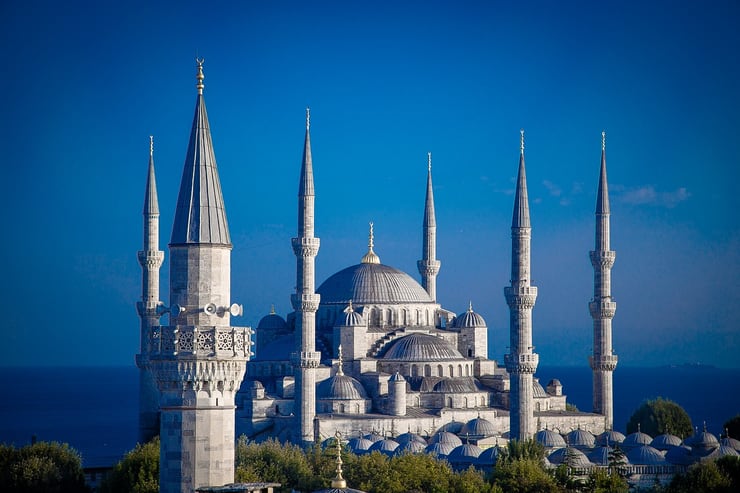
Diverse Cultural Character Thanks to Asian and European Influences
Turkey is a unique cultural mix where Asian and European cultures meet, thanks to its geographical location that has made it a bridge between East and West throughout the ages. Throughout history, Turkey has been influenced by many civilizations that have left their mark on Turkish culture, such as Byzantine, Persian, Ottoman and Greek.
This cultural diversity is clearly evident in the Turkish lifestyle that blends modernity and tradition; Modern European influences are found in major cities such as Istanbul and Ankara, while Eastern traditions are clearly evident in rural and southern areas. Asian influences are also evident in popular foods such as kebab and shawarma, while major cities reflect European influences in infrastructure and daily lifestyles.
Cultural diversity can also be observed in Turkish art and music, as Turkey preserves ancient art forms such as Sufi music and dervishes, along with contemporary music influenced by Western melodies. Turkish literature combines Arab and Persian heritage with modern European literature.
Distinctive Turkish customs and traditions and famous occasions such as holidays and national celebrations
Turkish customs and traditions: Turks are famous for their distinctive social customs that rely on generosity and hospitality. Receiving guests and offering Turkish tea and coffee are deeply rooted customs in Turkish society, where tea is served in distinctive small cups and exchanged as a symbol of welcome and friendliness. Turkish families are very close-knit, with family members living together for long periods, and Turks show great respect for the elderly. National and Religious Holidays: Turks celebrate Republic Day on October 29 every year, the day the Turkish Republic was declared. In addition, there is Victory Day on August 30, which celebrates the victory of Turkish forces during the War of Independence. As for religious holidays, Turks celebrate Eid al-Fitr and Eid al-Adha, which are important occasions that witness family gatherings and the exchange of gifts and food.
Folk Celebrations: One of the most famous celebrations in Turkey is the Konya Festival, which celebrates the birth of Jalal ad-Din Rumi, and includes Sufi events such as dervish dancing. The Spring Festival is also held in the Black Sea cities, where people gather to celebrate the arrival of spring and perform traditional activities such as folk dances and games.
Traditional Turkish Fashion and Its Influence on Modern Fashion Designs
Traditional Turkish fashion is characterized by its great diversity, as traditional clothing varies from one region to another. Traditional women's clothing includes the long, decorated dress known as the "yemeni", with a colorful headdress that reflects the cultural diversity between regions. Men usually wear Turkish hats such as the fez and sometimes wear the traditional costume of loose trousers and a decorated shirt.
Traditional fashion has become a source of inspiration for modern fashion designs, as Turkish designers combine traditional elements with contemporary designs. For example, we find embroidered fabrics and traditional decorative patterns appearing in modern clothing, whether in abayas or casual wear. Turkish designers are world-famous for presenting innovative designs that reflect Turkish identity and combine authenticity with modernity.
Silk fabrics and hand-made decorations are very popular in Turkey and are part of the traditional industry, as they are exported to global markets. The Turkish influence can be seen in global fashion designs, especially in Middle Eastern and European fashions that draw some of their elements from Turkish fashion.
Turkish culture is a rich palette that blends East and West, combining ancient traditions with modern touches. This diverse culture is reflected in lifestyle, social customs and fashion, giving Turkey a special character and making it an attractive destination for visitors and those looking for a unique cultural experience that reflects the succession of civilizations and the intermingling of cultures.
Conclusion
Turkey is one of the countries that captures global attention thanks to its ancient history, cultural diversity and natural beauty, making it the focus of historians, experts and even visitors from all over the world.
Turkey has a unique strategic location, which has given it geopolitical and cultural importance that has made it a vital center throughout the ages and a corridor for international trade and cultural influence between the East and the West. Thanks to this location, Turkey has witnessed the succession of many great civilizations such as the Hittite, Roman, Byzantine and Ottoman, which left their mark on every corner of its lands, making Turkey today an open museum that tells a history full of events.
Turkey has the makings of a successful state, as it has maintained its political and social stability in the face of major challenges, and has worked hard to improve its infrastructure and develop the economy, despite the fluctuations it faces. The Turkish economy is distinguished by its diversity, as it includes several sectors such as industry, tourism and agriculture, which are important sources of national income and support the country's ambitious development trends.
Despite the economic crises and inflation challenges, Turkey does not hesitate to plan major development projects, such as renewable energy and infrastructure projects, in addition to strengthening its role as a logistics and commercial center serving the region and the world.
Read Also:
Information about Türkiye 1 - Amazing Facts
Information about Türkiye 3 - Tourism, Education, Religion and Daily Life


